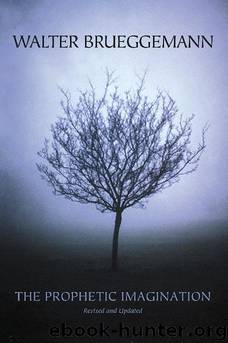Prophetic Imagination: Revised Edition by Walter Brueggemann

Author:Walter Brueggemann [Brueggemann, Walter]
Language: eng
Format: epub
Tags: Theology, Non-fiction, Religion
ISBN: 9780800632878
Google: VBUg98Ty6MAC
Amazon: 0800632877
Goodreads: 97827
Publisher: Fortress Press
Published: 2001-06-26T06:00:00+00:00
It is the crucifixion of Jesus that is the decisive criticism of the royal consciousness. The crucifixion of Jesus is not to be understood simply in good liberal fashion as the sacrifice of a noble man, nor should we too quickly assign a cultic, priestly theory of atonement to the event. Rather, we might see in the crucifixion of Jesus the ultimate act of prophetic criticism in which Jesus announces the end of a world of death (the same announcement as that of Jeremiah) and takes the death into his own person. Therefore we say that the ultimate criticism is that God embraces the death that God’s people must die.16 The criticism consists not in standing over against but in standing with; the ultimate criticism is not one of triumphant indignation but one of the passion and compassion that completely and irresistibly undermine the world of competence and competition. The contrast is stark and total: this passionate man set in the midst of numbed Jerusalem. And only the passion can finally penetrate the numbness.
Passion Announcements. The radical criticism embodied in the crucifixion can be discerned in the “passion announcements” of Mark’s Gospel:
And he began to teach them that the Son of man must suffer many things, and be rejected by the elders and the chief priests and the scribes, and be killed, and after three days rise again. (Mark 8:31)
“The Son of man will be delivered into the hands of men, and they will kill him; and when he is killed, after three days he will rise.” (9:31)
“Behold, we are going up to Jerusalem; and the Son of man will be delivered to the chief priests and the scribes, and they will condemn him to death, and deliver him to the Gentiles; and they will mock him, and spit upon him, and scourge him, and kill him; and after three days he will rise.” (10:33–34)
There is no more radical criticism than these statements, for they announce that the power of God takes the form of death and that real well-being and victory only appear via death. So the sayings dismantle the dominant theories of power by asserting that all such would-be power is in fact no-power. Thus the passion announcements of Jesus are the decisive dismissal of every self-serving form of power upon which the royal consciousness is based. Just that formula, Son of man must suffer—Son of man/suffer!—is more than the world can tolerate, for the phrase of ultimate power, “Son of man,” has as its predicate the passion to death. It is true that no precise counterpart can be found in the history of Moses. Moses never speaks or acts in this way; but we may pause to discern important continuities between the two. Moses also dismantled the empire and declared it to be a no-power (remember Exod 8:18) by disregarding the claims of the imperial reality and trusting fully in the Lord of justice and freedom. In parallel fashion, the dominant power is dismantled by appeal to an uncredentialed God.
Download
This site does not store any files on its server. We only index and link to content provided by other sites. Please contact the content providers to delete copyright contents if any and email us, we'll remove relevant links or contents immediately.
Sarai by Smith Jill Eileen(578)
Zondervan Handbook of Biblical Archaeology: A Book by Book Guide to Archaeological Discoveries Related to the Bible by Price J. Randall & Price J. Randall & House H. Wayne & House H. Wayne(544)
Food in Ancient Judah by Shafer-Elliott Cynthia(502)
Christian Faith in the Old Testament: The Bible of the Apostles by Gareth Lee Cockerill(496)
Essential Exposition of the Psalms by Saint Augustine(494)
Becoming the Woman God Wants Me to Be by Donna Partow(466)
A Short Introduction to the Hebrew Bible by John J. Collins(409)
The Gospel According to Eve by Amanda W. Benckhuysen(390)
Through the Psalms With Derek Prince by Derek Prince(384)
The Life of Moses by Gregory of Nyssa(379)
Six Themes in Psalms Everyone Should Know by Creach Jerome F. D.;(358)
Creative Word: Canon As a Model for Biblical Education by Walter Brueggemann(356)
Psalms and the Life of Faith by Walter Brueggemann(352)
The Essence of the Old Testament by Ed Hindson & Gary Yates(339)
Who Were the Early Israelites and Where Did They Come From? by William G. Dever(339)
God Is More Than Enough by Tony Evans(336)
The Bible Unearthed: Archaeology's New Vision of Ancient Israel and the Origin of Sacred Texts by Israel Finkelstein & Neil Asher Silberman(328)
Agents of Grace: The People in David’s Life and in Yours by Koester Robert J(311)
Yahweh is a Warrior The Theology of Warfare in Ancient Israel by Millard C. Lind(304)
